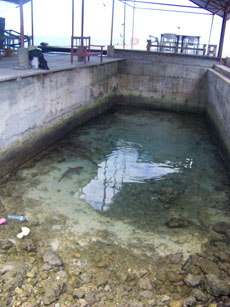The Anti-Corruption Commission (ACC) has asked the Prosecutor General’s Office (PGO) to press corruption charges against former Fisheries and Agriculture Minister Abdulla Kamalludheen for alleged abuse of power to unduly benefit a third party.
The ACC said in a press statement on Wednesday (October 2) that Kamalludheen renewed the lease for Kaafu Thun’bafushi in November 2006 despite multiple violations of the agreement by the leaseholder – business magnate ‘Champa’ Mohamed Moosa.
Based on documents from the fisheries ministry and the former minister’s testimony, the ACC found that Kamalludheen was aware that dredging, construction of a seawall, and reclamation work was done in Thun’bafushi without either conducting an Environment Impact Assessment (EIA) or seeking authorisation from the government.
Moreover, the island was used without a lease agreement from August 2004 to November 2006, the ACC noted, after the agreement expired.
The initial agreement signed in August 1999 authorised the government to reclaim the island with 15 day’s notice if any clauses were violated.
The ACC found that Kamalludheen informed the President’s Office in 2004 that the ministry did not invoke the clause to terminate the agreement as the illegal actions could not be undone.
The former fisheries minister told ACC investigators that, as senior officials and staff from the ministry frequently visited the island, “it cannot be said that the work carried out in Thun’bafushi was done without the ministry’s knowledge”.
While Kamalludheen claimed that the decision to renew the lease was made following consultation with the President’s Office, the ACC contended that the minister had to bear responsibility for “losses to the state” due to his culpability or negligence.
Abdulla Kamalludheen served as fisheries minister and home minister in the cabinet of former President Maumoon Abdul Gayoom. He is currently a senior member of the Jumhooree Party (JP) and was involved in campaigning for JP presidential candidate, business tycoon Gasim Ibrahim.
“Environmental criminal”
 In June 2011, the Environment Protection Agency (EPA) labelled Champa Moosa “an environmental criminal” and fined him the maximum penalty of MVR100 million (US$6.5 million) for irreversibly damaging the marine ecosystem around Thun’bafushi.
In June 2011, the Environment Protection Agency (EPA) labelled Champa Moosa “an environmental criminal” and fined him the maximum penalty of MVR100 million (US$6.5 million) for irreversibly damaging the marine ecosystem around Thun’bafushi.
“This was originally a reef ecosystem with a small sand bank in the middle, but he has been dredging the island without any clearance and the changes are now irreversible,” EPA Director Ibrahim Naeem told Minivan News at the time.
After three surveys of the area, the EPA had assessed the damage as amounting to MVR2.2 billion (US$144.6 million), not including the impact of sedimentation from the dredging which can smother coral kilometres from the site.
A foreign consultant who was involved in surveying the island told Minivan News that the area “seems to have been used as a dumping ground.”
“There were what looked like hundreds of used car batteries, waste metals and oil drums leeching into the marine environment,” the consultant said.
Fine overturned
In November 2011, the Civil Court overturned the EPA’s MVR100 million fine on the grounds that the administrative action was not “lawful, procedurally fair, and expeditious” as required by article 43 of the constitution.
action was not “lawful, procedurally fair, and expeditious” as required by article 43 of the constitution.
The judge ruled that the EPA had not given Champa Moosa adequate opportunities to respond to the allegations, which made the administrative procedure “unfair.”
Naeem however insisted that the EPA had given all necessary documents to Champa and that he had been given “more than enough time to prepare his appeal.”
Several days after Champa was issued the fine in June 2011, the then-Director General of the EPA Mohamed Zuhair suddenly resigned from the post, publicly stating on DhiTV – a private broadcaster owned by Champa – that his departure was due to “political interference” in the EPA’s fining of the tycoon.
Environment Minister Mohamed Aslam however claimed that Zuhair had decided to take a voluntary redundancy package three weeks before his sudden departure, which rendered him ineligible for the lump sum pay out.
“This is Champa building his court case by attempting to question the independence of the EPA,” Aslam alleged at the time, noting that as the EPA’s Director General, Zuhair’s signature was on all the correspondence with Champa, including the notice informing him of the fine.

Naeem meanwhile expressed surprise at Zuhair’s DhiTV appearance, noting that “[Zuhair] was the guy who signed the letter [fining Champa]. Why would he have done so if he was not happy about it?”
Zuhair’s sudden resignation following the fining meant he had forfeited his entitlement to the redundancy package he had applied for, Aslam noted.
“Thun’bafushi has been an issue long before we took office,” Aslam said, explaining that the previous administration had initially rented the island to Champa for MVR100 a year (US$6.40) under an agreement that stipulated that he “not do anything detrimental to the environment – he was allowed to grow trees and monitor the shifting of the islands. He was not allowed to reclaim or extend the island.”


